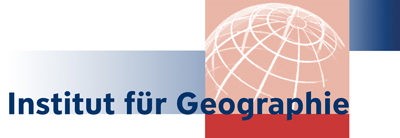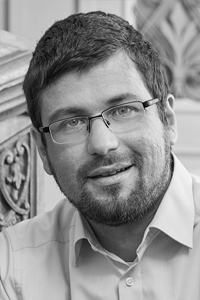Cultural and Political Geographies of the Digital Transformation
The socio-technical disruptions known as the “digital transformation” or, in some cases, the “digital revolution” are fundamentally changing geographies. At the Chair of Cultural & Political Geography in Erlangen, we study these upheavals from a cultural, social, and political geographic perspective. Within the German-speaking geography we have established the research context of a “Digital Geography” together with other colleagues and are internationally and interdisciplinarily networked in this field.
We are investigating in several projects how the production and use of geographic information changes in the digital transformation and which inequalities are (re-)produced (e.g. research on OpenStreetMap, on the role of geodata in the documentation of human rights violations as well as on the social and political background of “smart city” projects). For several years, we have also been conducting research on the increasing geopoliticization of the digital transformation.
- , , , , , , , , , , , , , , , , , :
Contested Spatialities of Digital Sovereignty
In: Geopolitics 28 (2023), p. 919-958
ISSN: 1465-0045
DOI: 10.1080/14650045.2022.2050070
BibTeX: Download- , :
Spatial Concepts, Approaches and Methods for Digital Humanities – An Introduction to the Book
In: Finn Dammann, Dominik Kremer (ed.): Geographical Research in the Digital Humanities. Spatial Concepts, Approaches and Methods, Bielefeld: Bielefeld University Press, 2024, p. 7-12 (Digital Humanities Research, Vol.8)
ISBN: 978-3-8376-6918-3
Open Access: https://www.transcript-verlag.de/media/pdf/22/3a/2a/oa9783839469187xd0q4zVqzoIrR.pdf
BibTeX: Download- , :
Kritisches Kartieren – zur Einführung
In: Finn Dammann & Boris Michel (ed.): Handbuch Kritisches Kartieren, 2022, p. 9-21 (Sozial- und Kulturgeographie, Vol.51)
BibTeX: Download- , :
»Wir müssen als Deutsche und Europäer unsere digitale Souveränität zurückgewinnen!« Historische Rekonstruktion und internationale Kontextualisierung der Diskurse einer »digitalen Souveränität« in Deutschland
In: Georg Glasze / Eva Odzuck / Ronald Staples (ed.): Was heißt digitale Souveränität? Diskurse, Praktiken und Voraussetzungen »individueller« und »staatlicher Souveränität« im digitalen Zeitalter, Transcript: Transcript, 2022, p. 29-60 (Politik in der digitalen Gesellschaft, Vol.3)
Open Access: https://www.transcript-verlag.de/978-3-8376-5827-9/was-heisst-digitale-souveraenitaet/
URL: https://www.transcript-verlag.de/978-3-8376-5827-9/was-heisst-digitale-souveraenitaet/
BibTeX: Download- , , , , :
Verfahren der lexikometrisch-compterlinguistischen Analyse von Textkorpora.
In: Georg Glasze & Annika Mattissek (ed.): Handbuch für Diskurs und Raum. Theorien und Methoden für die Humangeographie sowie die sozial- und kulturwissenschaftliche Raumforschung, Bielefeld: transcript, 2021, p. 313-343
BibTeX: Download
Project leader:
Prof. Dr. Georg Glasze
Ordinarius
Digital technologies trigger an intensifying datafication and enable a growing legibility of individual, social and socio-technical processes. Against this background, questions of access to, ownership and protection of data, that is to say questions of the configuration of data circulations are negotiated—often under the label of a “digital sovereignty”.
“Sovereignty”, the “sovereign state”, the “sovereign subject”and the “sovereign organisation”are fundamental concepts of (European) modernity. However, conceiving sovereignty as a form of absolute self-determination has been criticised by many authors as a normative ideal—a myth. Conversely, positing sovereignty as relational de-essentialises and re-conceptualises sovereignty as social, thusenabling us to analyse negotiations of (potentially competing) claims for sovereignty.
The highly interdisciplinary research group “Discourses and Practices of Digital Sovereignty” aims at (I) an-alysing the debate on “digital sovereignty”, developing a concept of sovereignty as relational,and relating this concept to established disciplinary discussions of the concept of sovereignty. The findings of “What ‘is’digital sovereignty?” serve as an overarching framework to be challenged by a closely knit set of em-pirical studies.In nine empirical research areas (II) new configurations of data circulation are examined (see Fig.).
These studies interact along four research axes: Firstly, we compare how claims to sovereignty are articulated by the actors within the respective areas and to what extent the concept of a relational sovereignty helps to understand these empirical cases. Secondly, several studies analyse to what extent intensifying datafication facilitates increasing legibility of individual, social and socio-technical processes and how these growing data legibilities transform socio-economic and socio-political processes—enabling innovations and threatening established structures. Thirdly, intensifying datafication and increasing legibility are closely related to the areas of conflict between (concepts and practices of) data access,data ownership and data protection. At least four of the nine empirical studies deal with these political economies of data.
Last but not least, intensifying datafication and increasing legibility challenge individual and organisational competencies regarding data. Thus, lastly, five projects will deal with questions of data competencies.

Fig. 1: Research Design
Funding source: DFG-Einzelförderung / Sachbeihilfe (EIN-SBH)
Project leader:
Prof. Dr. Georg Glasze
Ordinarius
Volunteered geographic information (VGI), that is to say, the voluntary and non-paid collection of geodata within the interactive web 2.0, has been interpreted as a chance for giving marginalized voices access to the compilation and dissemination of geographic information. However, the idea that within the web 2.0 everybody could participate in the fabrication of geographic information has been rapidly questioned, pointing to the different social and socio-technical forms of exclusion. Yet, despite…
Funding source: Industrie
Project leader:
Prof. Dr. Georg Glasze
Ordinarius
Funding source: Bayerische Forschungsallianz (BayFOR)
Project leader:
Prof. Dr. Georg Glasze
Ordinarius
Funding source: DFG-Einzelförderung / Sachbeihilfe (EIN-SBH)
Project leader:
Prof. Dr. Georg Glasze
Ordinarius
Funding source: Stiftungen
Project leader:
Prof. Dr. Georg Glasze
Ordinarius
Im Rahmen desPromotionsvorhabens beschäftigt sich Christian Eichenmüller mit der Lesbarkeit und Kalkulierbarkeit städtischer Räume, die im Kontext der Digitalisierung städtischer Infrastruktur einen neuen Schub erfährt. Das Ausmaß von ‚Lesbarmachung‘ und Kalkulierbarkeit städtischer Räume ist nicht einfach gegeben, sondern wird aktiv produziert. Zur Lesbar- und Sichtbarmachung und zur Herstellung von Kalkulierbarkeit urbaner Räume bedarf es Einheiten, die identifiziert, dokumentiert, gezählt und ü…
Funding source: Bayerisches Staatsministerium für Bildung und Kultus, Wissenschaft und Kunst (ab 10/2013)
Project leader:
Digitaler Campus Bayern
Project leader:
Funding source: andere Förderorganisation
Project leader:
Prof. Dr. Georg Glasze
Ordinarius
Funding source: DFG-Einzelförderung / Sachbeihilfe (EIN-SBH)
Project leader:
Funding source: Bundesministerium für Forschung, Technologie und Raumfahrt (BMFTR)
Project leader: , ,
The project "Geo-Data for the Digital Documentation of Human Rights Violations" (GeoDatRights) aims to a) use satellite-based remote sensing and social media data to investigate the destruction and military appropriation of educational institutions in war zones, and b) establish digital analysis skills in German-language human rights research over the course of the project. FAU already has a distinctive human rights profile and aims to expand it in a forward-looking way.
In the GeoDatRights…
Project leader: , ,
Prof. Dr. Georg Glasze
Ordinarius
Dr. Dominik Kremer
Studienberatung MA Digital Humanities
In geography and many other disciplines (e.g., archaeology, art history, biology, geology), field trips enable on-site learning. Digital media can contextualize locations…
Funding source: Stiftungen
Project leader:
Das Vorhaben beforscht den Prozess der Entstehung europäischer (Cloud-)Infrastrukturen, welche die souveräne Digitalisierung von Staat, Industrie und Gesellschaft vorantreiben sollen. In diesem Prozess soll eine der wichtigsten Infrastrukturen des 21. Jahrhunderts – das Internet – ‚europäisiert‘ werden. Es ist zu erwarten, dass dabei dauerhafte Pfadabhängigkeiten und damit auch bleibende gesellschaftliche Realitäten geschaffen werden.
Darüber hinaus werden in der europäischen Internetpoliti…
Funding source: DFG-Einzelförderung / Sachbeihilfe (EIN-SBH)
Project leader:
Prof. Dr. Georg Glasze
Ordinarius
This project examines transformations and tensions in the field of open geospatial data. It’s starting point is the growing role of commercial and institutional actors in OpenStreetMap (OSM). In the context of the OSM open geospatial database – a project that relies heavily on the voluntary engagement of local communities of mappers – these developments have significant implications for geospatial data.
The research project starts from the premise that there is a tension between the ethos of OSM as a project that builds on local knowledge and practices of digital commoning, and concerns about the remote and extractivist practices of institutional actors. These concerns are particularly articulated by decolonial and feminist voices within the OSM community and raise questions about the power of mapping as well as organisational issues of participation, polyphony and data sovereignty.
The research project has three aims: 1) to analyse the changing production and use of geographic knowledge and data in OSM, 2) to trace interactions, intersections and conflicts between the different groups of actors, 3) to examine the changing governance of OSM at the intersection of digital commoning, digital humanitarianism and digital capitalism.
These objectives will be addressed through two complementary case studies. The first study focuses on the strategies and policies of key institutional actors in OSM (e.g. commercial actors such as Meta and Microsoft, the Overture Maps Foundation, and the Humanitarian OSM Team). Of particular interest are the relationships, conflicts and tensions between these institutional actors and key actors in the OSM community. The second case study explores the practical interactions between local mapping communities and institutional actors at the local level. It focuses on the Philippines, a site where local communities of mappers interact, intersect and struggle with actors and concepts of digital platform capitalism and humanitarianism.
Projects and publications in the Current Research Information System @FAU (CRIS)




